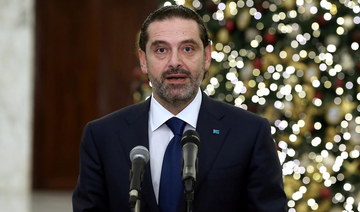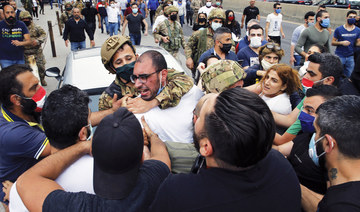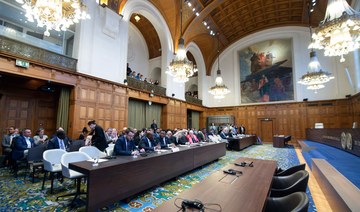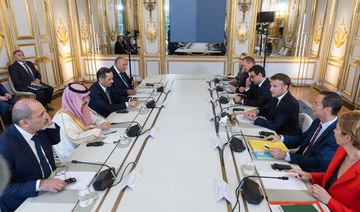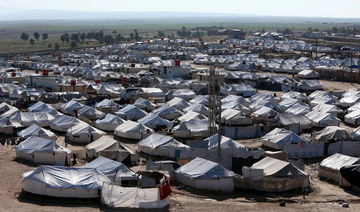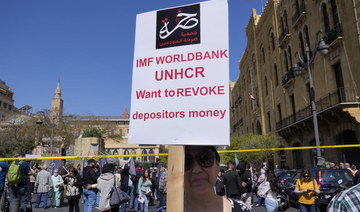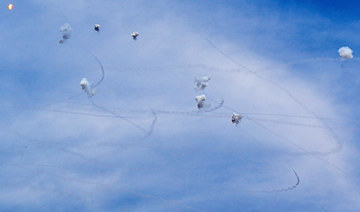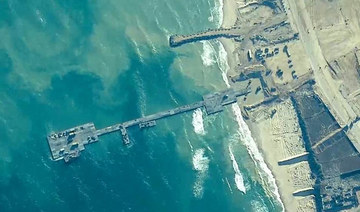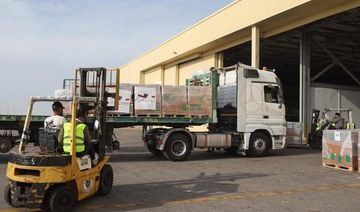BEIRUT: Student movements at Lebanese universities and independent civic groups are reorganizing themselves with the goal of changing the ruling authority in Lebanon.
Secular and independent clubs affiliated with the Mada network in Lebanon’s universities launched the “Declaration of Lebanese Students” on Saturday, in light of “the unprecedented risks threatening students, especially the crisis of the dollarization of tuition fees.”
That dollarization has seen tuition fees start to massively increase at institutions across the country, following decisions to adopt the Lebanese Central Bank’s new exchange rate of 3,900 Lebanese pounds to the dollar. The American University of Beirut (AUB) saw its tuition costs increase 160 percent alone as a result.
Lebanon has been in the grip of a currency crisis ever since the pound, previously pegged at 1,500 to the dollar, began to devalue rapidly as a consequence of political and economic mismanagement, blamed by many on the country’s elite.
Student elections at a number of private universities in Lebanon resulted in a series of unprecedented victories for independents, especially secular representatives, on representative councils this year, after decades of being held by students from the country’s ruling parties.
The representative of the Secular Club at Saint Joseph University, student Charbel Shaya, said: “The independent, unified student movement has turned the tables after student representation was confiscated by parties in power. I believe that networking between us has led to achievement, and the time has come to fight the battle of refusing the dollarization of tuition fees as a prelude to rejecting what the parties committed against us as people.”
Qamar Suleiman, a medical student at the University of Balamand, said: “Political awareness in universities is one of the means for change. Politics controls the corners of our lives, and engaging in student elections is a step toward creating independent secular groups that believe in social justice to improve student life and protect their rights.
“We want to impose a truly progressive and clear political discourse that establishes grounds for individuals capable of practicing political life in a sound manner after graduation,” he added. “The parties in power make us pay for things that we did not commit, but rather they did.”
Manal Suleiman, an engineering student at Notre Dame University, said: “Universities are the ones that should fear their students, just as governments should fear their people. Students today are reclaiming their role through independent student movements that aim for change.”
And Jad Al-Hani, from the AUB, said: “The retreat of the (main) parties in the student elections at the university was a declaration of defeat. The first battle we will fight is the battle against dollarizing tuition fees. We are headed toward an escalation in the coming days.”
On Saturday, the opposition member of Parliament, Brig. Gen. Chamel Roukoz, called on the Lebanese youth not to leave their homeland “in the custody of those who betrayed the land and the people.”
Roukoz, the son-in-law of President Michel Aoun, said: “The victory of student elections in universities is the best evidence of the failure of this authority, which today, more than ever, feels at risk of removal.”
Roukoz said during a meeting with his supporters, many of whom have participated in protests that have lasted months: “Two years after my entering the political arena, I see that the logic of obstruction overrides the logic of legislation — or legislation in the interest of profiteers … at the people’s expense. There is no intention in the foreseeable future to adopt any correct anti-corruption policy, nor any real financial, economic, social, and rescue strategy to address the crisis from which the Lebanese people are suffering.”
He described the leaders in Lebanon as failures, and said: “Building the homeland cannot be carried out by militias, that were the reason for the nation’s entry into a bloody civil war, nor by tailoring departments and institutions to suit the sects and their leaders.”
Meanwhile, the Lebanese Army was deployed near the residence of Parliament Speaker Nabih Berri over fears he could be targeted by protesters.
In recent days, groups have tracked down political and economic figures, following them to restaurants and cafes to protest, accusing them of theft, including former minister Adnan Kassar, the wife of the governor of the Banque du Liban, Nada Riad Salameh, and the secretary-general of the Future Movement, Ahmad Hariri.
Elsewhere, trade unions affiliated with the General Labor Union are set to go on strike next Wednesday in rejection of any move to cut subsidies for basic goods.
Union leader, Bechara Al-Asmar, said on Saturday that “political conflicts do not bode well, but rather increase the tragedies of the Lebanese people. A minimum level of understanding is required to form a government that can handle the crises.”
In a report issued earlier this month, the World Bank warned in a report that “Lebanon is suffering from a dangerous depletion of resources, including human capital.”
The report highlighted that “a contraction of Lebanese GDP per capita in real terms and high inflation in 2020 will undoubtedly result in a substantial increase in poverty rates and will affect the population through different channels such as the loss of productive employment, decline in real purchasing power, and stalled international remittance.”
Secular Lebanese student groups see political success amid national crisis
https://arab.news/re69f
Secular Lebanese student groups see political success amid national crisis

- Secular and independent clubs affiliated with the Mada network in Lebanon’s universities launched the “Declaration of Lebanese Students” on Saturday
- Dollarization of tuition fees has led to a huge increase in the cost of higher education
Gaza zookeeper fears for his animals after fleeing Rafah
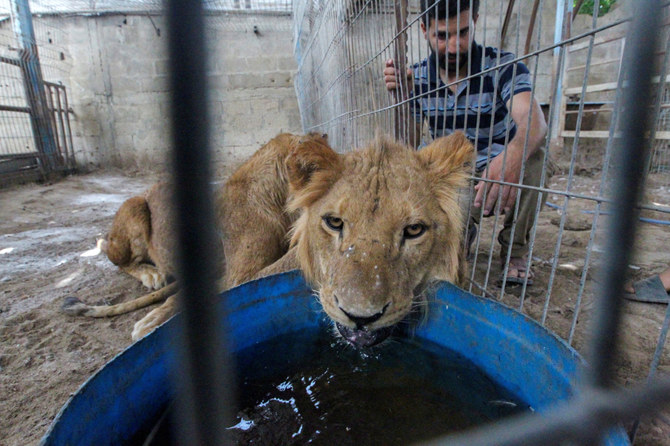
KHAN YOUNIS: In a cowshed in Gaza’s Khan Younis, zookeeper Fathi Ahmed Gomaa has created a temporary home for dozens of animals, including lions and baboons, having fled with them from Israel’s offensive in Rafah.
“We’ve moved all the animals we had, except for three big lions that remain (in Rafah),” he said.
“I ran out of time and couldn’t move them.” Ahmed abandoned his zoo in Rafah when Israel ordered the evacuation of parts of the southern Gazan city.
Before the offensive, the city on the border with Egypt had been spared a ground invasion, and more than half of the Gaza Strip’s population was sheltering there.
Now, the Israeli offensive has sent more than 800,000 people fleeing from Rafah, according to the UN, with Gomaa and his family among them.
“I am appealing to the Israeli authorities: these animals have no connection to terrorism,” Gomaa said, saying he wanted their help in coordinating with aid agencies to rescue the lions left behind in Rafah.
He fears they won’t survive long on their own.
“Of course, within a week or 10 days, if we don’t get them out, they will die because they’ll be left with no food or water.”
Gomaa said he had already lost several of his animals to the war: “Three lion cubs, five monkeys, a newborn monkey, and nine squirrels.”
And while the squawking of parrots fills the air, many of Gomaa’s other birds are no longer with him.
“I released some of the dogs, some of the hawks and eagles, some of the pigeons, and some of the ornamental birds. I released many of them because we didn’t have cages to transport them.”
In the cowshed, Gomaa is making do with what he has, using improvised fencing to raise the heights of the pens so that their new inhabitants, spotted deer, can’t leap out.
Israeli troops began their assault on Rafah on May 7, defying widespread international concern for the safety of the 1.4 million civilians sheltering in the city.
EU considers possible Rafah border mission, diplomats say
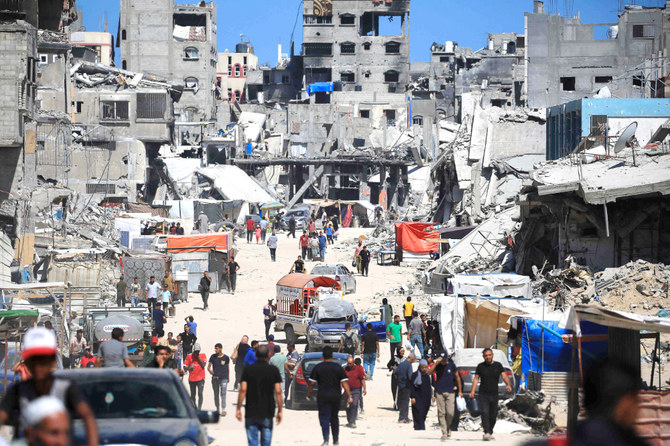
BRUSSELS: Talks on deploying a EU mission at the Rafah border crossing in Gaza are at a preliminary stage and the deployment will not happen without an end to the war between Israel and Hamas, a senior EU official said on Friday.
EU foreign ministers will hold their monthly meeting in Brussels on Monday, and discuss how to improve humanitarian aid deliveries to Gaza.
Two diplomats said the US had suggested the EU revive its EU Border Assistance Mission or EUBAM Rafah, which has not been operational since 2007, when Hamas seized full control of Gaza.
The crossing is the main entry point for aid from Egypt and has been closed since Israeli forces took control of it from the Gazan side nearly three weeks ago.
Rafah city is now fire in an Israeli military assault, which judges at the top UN court said on Friday should immediately halt.
“Even if we now have people on the ground talking to the different parties and seeing how it could be done, we are in a very preliminary part of the story,” said the senior official.
The official said EU foreign policy chief Josep Borrell could be mandated by the 27 members on Monday to come up with “some kind of operative conclusions that could allow the mission to deploy.”
He said a deployment could not happen “in the current circumstances, not in war circumstances.”
“We are talking about the future,” the official said.
Three EU diplomats said the discussion would be on the table, but there was nothing concrete to discuss. One said the proposal was a “long shot.”
The mission would need unanimous approval from EU member states. Also, EUBAM is a civilian mission, and given the potentially dangerous nature of the operation, personnel and equipment would need to be adapted.
Diplomats said that such a mission could go ahead only if Egypt and Israel were also in favor.
Two US officials said Washington was reviewing options to secure the opening of the Rafah crossing, but no definitive plans have been developed yet. Israel began its offensive in Gaza after Hamas’ deadly attack on southern Israel on Oct. 7.
Four Britons repatriated from Syria camp, Kurds say
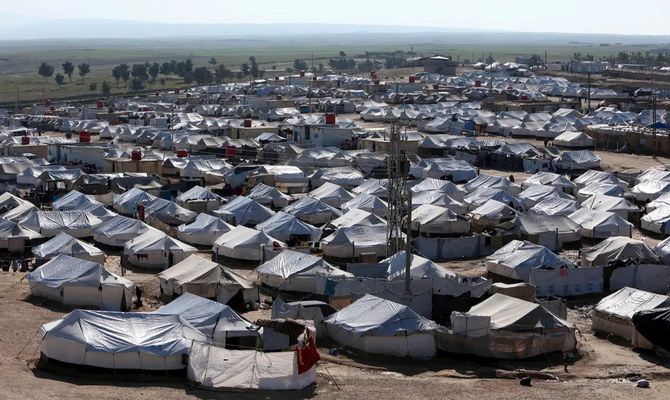
- The Kurdish administration said it had “handed over a woman and three children to the United Kingdom“
- The four had been interned in the Roj camp where militants’ relatives are held
QAMISHLI, Syria: Kurdish authorities in northeast Syria said Friday that they had handed over a woman and three children to British representatives for repatriation, with a source saying they had been held in a camp for militants’ relatives.
Five years after the Daesh group was driven out of its last bastion in Syria, tens of thousands of the militants’ family members, including from Western countries, remain in detention camps in the Kurdish-controlled northeast.
The Kurdish administration said it had “handed over a woman and three children to the United Kingdom,” following a meeting with a British delegation led its Syria envoy Ann Snow.
A source within the administration told AFP the four had been interned in the Roj camp where militants’ relatives are held.
Britain’s foreign ministry said UK officials had “facilitated the repatriation of a number of British nationals from Syria to the United Kingdom.”
“This repatriation is in line with the long-standing policy that all requests for UK consular assistance from Syria are considered on a case-by-case basis, taking into account all relevant circumstances including national security,” the spokesperson said.
On May 7, the United States announced it had brought back 11 Americans including five minors, as well as a nine-year-old non-US sibling of an American, from internment camps in northeastern Syria.
The United States in the same operation facilitated the repatriation of six Canadian citizens, four Dutch citizens and one Finnish citizen, eight of them children, Secretary of state Antony Blinken said.
And in December, the Kurdish administration handed over to Britain a woman and five children who had also been held in a camp.
Despite repeated appeals by the Kurdish authorities, a number of Western countries have refused to take back their citizens from the camps.
Among the most high profile cases is that of Shamima Begum, a former Briton stripped of her citizenship after leaving the country aged 15 to marry an Daesh group fighter.
Lebanon ‘open to any effort to curb Israeli aggression,’ says Berri
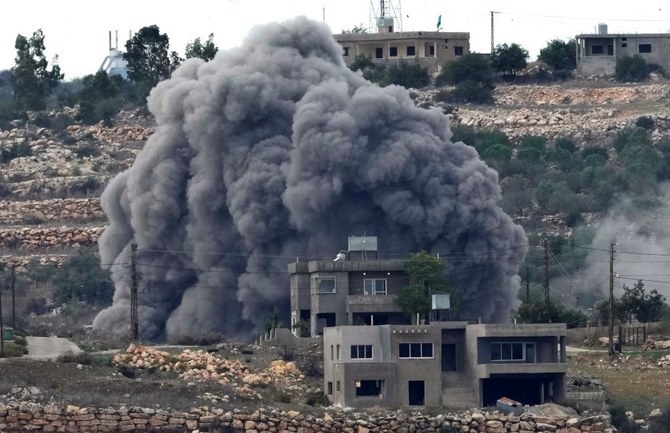
- Parliamentary speaker accuses Israel of ‘greed’ over Lebanese resources
- Berri’s statement came as hostilities between Hezbollah and the Israeli army in the southern border region entered their 230th day
BEIRUT: Lebanon is willing to cooperate with any international effort to stop Israeli aggression and bring security to the region, Parliamentary Speaker Nabih Berri said on Friday.
However, in a statement marking the 24th anniversary of Israel’s withdrawal from southern Lebanon in 2000, Berri warned that Lebanon “is not ready to waive any of its sovereign rights.”
He also accused Israel of displaying “greed toward Lebanon, its resources, its entity, and its land, sea, and air borders.”
Berri’s statement came as hostilities between Hezbollah and the Israeli army in the southern border region entered their 230th day.
The parliamentary speaker called for intensified international and regional efforts to halt Israel’s assault in the Gaza Strip, saying this was crucial to maintain security and stability in the entire region.
Hezbollah claims its actions have been in support of Gaza amid further Israeli threats to Lebanon.
Israeli Prime Minister Benjamin Netanyahu vowed on Thursday from the northern command headquarters “to carry out detailed, important and even surprising plans to return displaced settlers to the north.”
He claimed Israel had killed hundreds of Hezbollah fighters.
Benny Gantz, a minister in the Israeli war Cabinet, said: “Get ready from now on for the return of the residents of the north to their houses safely in early September by force or order.”
Berri returned from Tehran after attending the funeral of Iranian President Ebrahim Raisi, who was killed in a helicopter crash on May 19.
In his message to the Lebanese, he renewed Lebanon’s “commitment and adherence to UN Resolution 1701, and all its terms and stipulations.”
The resolution calls for an end to hostilities between Israel and Hezbollah, the withdrawal of Israeli forces from Lebanon to be replaced by Lebanese and UNIFIL forces in southern Lebanon, and the disarmament of armed groups including Hezbollah.
Berri accused Israel of ignoring the resolution “since the moment it was issued, with over 30,000 land, sea and air violations.”
Lebanon “upholds its right to defend its land with all the available means in the face of Israeli hostilities,” he said.
He called for the liberation of “the remaining occupied territory in the Kfarchouba Hills, the occupied Shebaa Farms, the northern part of the GHajjar village, and the contested border points with occupied Palestine all the way to the B1 point in Ras Al-Naqoura.”
Caretaker Minister of Defense Maurice Slim said that Lebanon preferred peace to war.
However, “defending the land was and will be the Lebanese state’s choice through the resilience of its army and people, especially the steadfast ones who are still residing in their villages and towns to repel the aggression,” he said.
Israeli warplanes on Thursday struck the town of Maroun Al-Ras in the Bint Jbeil district.
Sirens sounded in Israeli settlements opposite the border with Lebanon amid fears of possible drone attacks.
The Israeli newspaper Yedioth Ahronoth reported on Friday that Hezbollah’s drones caused significant damage in the northern towns and resulted in several fatalities.
Another newspaper, Israel Hayom, said that Hezbollah’s drones are “one of the biggest threats facing Israel in the northern arena.”
The newspaper said that Hezbollah leader Mohammed Hassan Fares, who was killed by an Israeli drone strike last week in Qana, was a scientist who specialized in robotics and machine learning.
2,000 aid trucks stuck at Rafah border: Norwegian Refugee Council
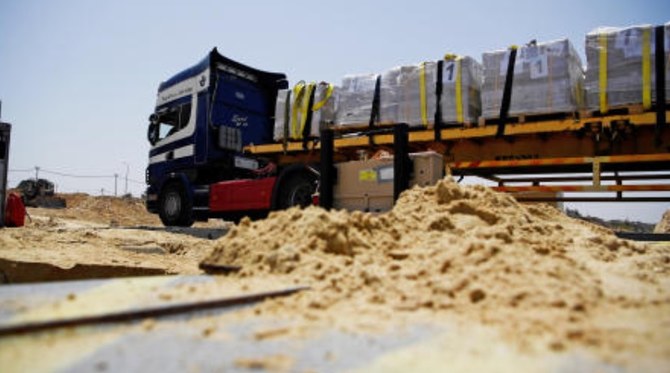
- Palestinians ‘actively deprived’ of essential items as Israel steps up operations in city
- Some in Gaza have been displaced as many as 9 times since October
LONDON: The Norwegian Refugee Council has warned that 2,000 aid trucks are stuck in Egypt at the Rafah border crossing, with Palestinians in Gaza being “actively deprived” of essential goods.
Rafah is the last remaining area of Gaza yet to come under full assault by Israeli forces, with fears now mounting of an imminent operation to take the southern city.
The NRC’s head of operations in Gaza, Suze van Meegen, told the BBC: “The city of Rafah is now comprised of three entirely different worlds: the east is an archetypal war zone, the middle is a ghost town, and the west is a congested mass of people living in deplorable conditions.”
She said medical supplies, tents, water tanks and food are being held up at the border, and in some cases Palestinians in Gaza have been displaced as many as nine times since Israel launched its military operation last October.
“People have no choice but to put their faith in so-called ‘humanitarian safe zones’ designated by the forces that have killed their family members and destroyed their homes,” she added.
Israeli journalist Amos Harel told the BBC that he believes Israel is moving ahead with plans to occupy Rafah with tacit US support.
“It’s quite clear that the Americans are no longer trying to prevent Israel from occupying Rafah. So the Israelis may proceed carefully and not too quickly. But it’s less of a question of whether the Israelis are going to occupy Rafah. It’s quite clear that they are,” he said.
It comes despite earlier warnings by US President Joe Biden against Israel attacking “population centers,” and with the International Court of Justice set to rule on the legality of the Israeli campaign in Gaza after a case was submitted by South Africa in December accusing Israel of genocide.



